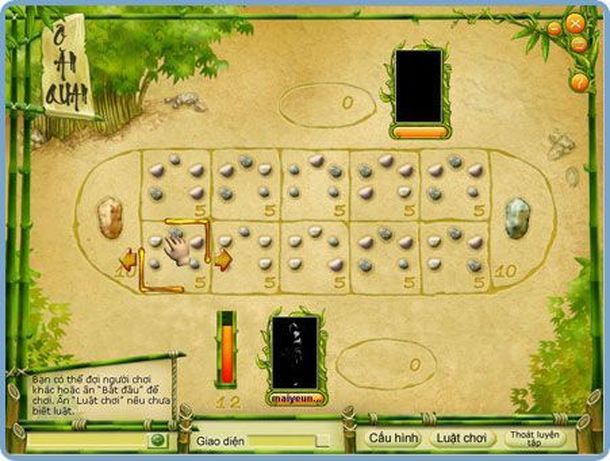Ô Ăn Quan társasjáték
társasjáték,
Az Ô Ăn Quan egy remek társasjáték, 2 - 4 játékos részére, az átlagos játékidő rövid, csak 10 perc. A társas elsősorban gyerekeknek készült, akár már 5 éves kortól is játszható. A játékmenet erősen épít a mancala mechanizmusra.
Angol:
Ô Ăn Quan (literally: "Mandarin Square Capturing"), also known as Ô Làng ("Village Squares"), is a mancala game played by Vietnamese girls usually seven to ten years old....
Angol leírás
Ô Ăn Quan (literally: "Mandarin Square Capturing"), also known as Ô Làng ("Village Squares"), is a mancala game played by Vietnamese girls usually seven to ten years old. According to Ngô Quý Sơn, the oldest western source on the game, it was once played by boys too. The game is valuable for promoting calculating abilities. It is said that the Vietnamese mathematician Mạc Hiển Tích discovered số ẩn (negative numbers; literally: "hidden / secret number") in 1086 by playing Ô Ăn Quan.
The game was first described in a western language (French) by Ngô Quý Sơn in 1944. It seems to be identical to Ô Làng described by Lynn Rohrbough in 1955. A Vietnamese mancala game was also mentioned in Viltis ("Hope") in 1984 (January-February issue), a magazine of folklore and folk dance published in Denver, USA.
There is a Vietnamese mancala board in the Musée du Quai Branly (Paris, France) called pan u ao, which comes from the Muong people in Hoa Binh in northern Vietnam and was collected in 1938. Perhaps it was used for Ô Ăn Quan. The game itself seems to be related to mancala games found in Yunnan, China, such as Laomuzhu and Ceelkoqyuqkoqiji.
Ô Ăn Quan is a traditional Vietnamese children's board game.
The board is an oval with five squares per side and, in addition, a bigger one at each end. The small squares are called "citizen squares" (ô dân), "ricefields" (ruộng) or "fishponds" (ao ci) and the big ones "mandarin squares" (ô quan). The board is drawn on the ground.
Each player or team controls five farmer squares, while the mandarin squares are neutral. Each player puts five pebbles (fruit seeds or other small objects) in each square he owns and a big stone, the "mandarin" (quan), on the mandarin square. The pebbles are known as dân ("people", "citizen").
On his turn a player picks up the contents of one of his ricefields and distributes the pebbles, one by one, in either direction on the following squares (including both mandarin squares). This is called rải ("to scatter").
When all pieces are distributed, the player repeats by taking up the pieces of the following square and distributing them.
When the next square to be distributed is empty, the player wins all the pieces in the square after that.
The game ends when the two mandarin squares are empty, which is called "fall of the mandarins" (hết quan). The winner is the player who has more points. Pebbles count 1 point, mandarins 10 points.
Kategória:
Stratégia, Gyerek játék
Mechanizmus:
Mancala
Párosan
Már ketten is játszható! Remek kikapcsolódás lehet pároknak is!
Rövid
Rövid játékidő! Ha csak gyors játékra vágysz a munka után, akkor ez a neked való!
Kicsinkek
Elsősorban gyerekek számára készült, de a szülőknek is remek kikapcsolódást nyújthat a közös játék élménye.
Ô Ăn Quan társasjáték vásárlása, árak és üzletek
Jelenleg egyik üzletben sem kapható a játék! Állíts be egy árufigyelést, hogy értesülj, amikor újra kapható lesz a boltokban!
Kommentek
Részletes adatok
Részletek
- Játékidő: 10 perc
- Játékosok: 2 - 4
- Ajánlott életkor: 5+
- Tervező: (Uncredited)
- Illusztrátor: (Uncredited)
- Kiadók: (Public Domain), Komarc Games
- Elérhető nyelvek: angol
Alternatív nevei
Kiadások
- English edition
- Kiadás éve: 2019
- Nyelv: angol
Hasonló játékok
Az alábbi játékok a hasonlítanak leginkább a(z) Ô Ăn Quan társasjátékhoz


